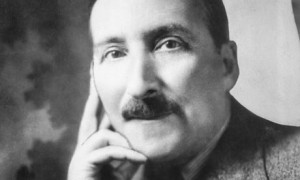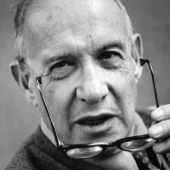In today’s Wall Street Journal drama column I write about two autobiographies, Stefan Zweig’s The World of Yesterday and Peter Drucker’s Adventures of a Bystander, whose similarities appear not to have been hitherto remarked. Here’s an excerpt.
* * *
 Sometimes all it takes is a movie. Stefan Zweig, a best-selling Austrian novelist who dropped off the Fame-O-Meter within a few years of his death in 1942, was catapulted back into the spotlight when Wes Anderson acknowledged that “The Grand Budapest Hotel,” his latest film, was inspired by Zweig’s books, and in particular by “The World of Yesterday,” the memoir in which he described the long-lost European culture into which he had been born six decades earlier. All at once it seemed that every magazine I read contained yet another excited essay about Zweig, and new paperback reissues of his out-of-print books started selling like…well, popcorn.
Sometimes all it takes is a movie. Stefan Zweig, a best-selling Austrian novelist who dropped off the Fame-O-Meter within a few years of his death in 1942, was catapulted back into the spotlight when Wes Anderson acknowledged that “The Grand Budapest Hotel,” his latest film, was inspired by Zweig’s books, and in particular by “The World of Yesterday,” the memoir in which he described the long-lost European culture into which he had been born six decades earlier. All at once it seemed that every magazine I read contained yet another excited essay about Zweig, and new paperback reissues of his out-of-print books started selling like…well, popcorn.
I, too, jumped on the bandwagon earlier this week. Though I’d always meant to read “The World of Yesterday,” I didn’t get around to it until “The Grand Budapest Hotel” brought Zweig back to mind. So I bought a copy and found myself swept up in his darkly nostalgic portrait of the self-confident, self-deluded culture of “security and creative reason” that was blown to bits by Adolf Hitler’s storm troopers. I didn’t get very far into the book, though, before I was struck by something else: “The World of Yesterday” is strikingly similar in both structure and tone to “Adventures of a Bystander,” Peter F. Drucker’s 1979 autobiography.
Most people remember Drucker, a longtime contributor to the Journal who died in 2005, as the most influential management consultant of the 20th century. What they may not know is that like Zweig, he was born in Austria and fled from the Nazis when Hitler came to power. What’s more, Drucker’s memories of prewar Vienna, which he compared in “Adventures of a Bystander” to Atlantis, Plato’s imaginary island paradise that fell from favor with the gods and disappeared into the Atlantic Ocean, are no less richly evocative than those in “The World of Yesterday.” And just as Zweig tells of his unforgettable encounters with such artists as Rainer Maria Rilke, Auguste Rodin and Arturo Toscanini, so is Drucker’s book largely devoted to indelible sketches of the fascinating men and women whom he met in the first half of his long life, who ranged from the great classical pianist Artur Schnabel to Henry Luce, the founder of Time magazine.
 The obvious difference between the two books is that one was written by a novelist and the other by a political philosopher (insofar as a single phrase can describe Peter Drucker). But Drucker, like Zweig, was a cultivated émigré with a passionate interest in the fine arts, and the Europe that he describes in “Adventures of a Bystander,” a carefree, culture-besotted place without passports in which people moved freely from country to country, fancying themselves citizens of the universe, is all but indistinguishable from the one portrayed by Zweig…
The obvious difference between the two books is that one was written by a novelist and the other by a political philosopher (insofar as a single phrase can describe Peter Drucker). But Drucker, like Zweig, was a cultivated émigré with a passionate interest in the fine arts, and the Europe that he describes in “Adventures of a Bystander,” a carefree, culture-besotted place without passports in which people moved freely from country to country, fancying themselves citizens of the universe, is all but indistinguishable from the one portrayed by Zweig…
* * *
Read the whole thing here.
The theatrical trailer for The Grand Budapest Hotel:
